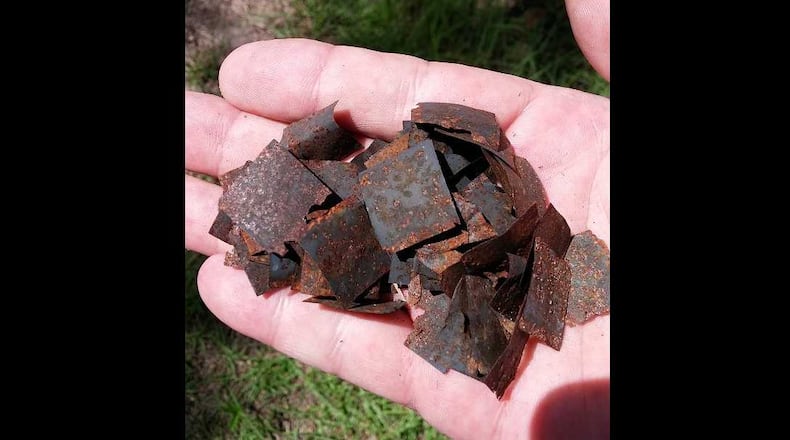Jesse Bentley was used to hearing the planes from nearby Moody Air Force Base flying over his pecan tree nursery on missions whose purpose he never knew or inquired into. But he was shocked two years ago to discover one of those planes had apparently dropped countless tiny metal shards on his farm, littering the land with an unknown military-grade substance.
“We didn’t have a clue what it was,” said Bentley, proprietor of Georgia Pecan Nursery, one of the state’s largest pecan nurseries, which straddles Lowndes and Lanier Counties in South Georgia.
“You would expect a neighbor, if something blew off of his farm or off the back of his truck, he would come pick up his trash, but they never did anything,” he said.
Two years later, Bentley, who rents the land, and the property owner, Lanier County Sheriff Charles “Nick” Norton, say the Air Force has stonewalled their requests for more information and help with cleanup. In the meantime, they have resorted to picking up the shards themselves, without knowing how to properly handle or dispose of them, or what contaminants to test for in the soil and water.
Bentley said he hasn’t noticed any adverse effects on his trees, but he worries about what he doesn’t know. In addition to growing pecan trees on the land, both the Norton and Bentley families use the 250-acre farm for hunting, cookouts and holiday celebrations.
“Everybody’s just exposed to it,” Bentley said. “Maybe it’s no big deal at all, maybe it is.”
The Air Force disputes this account.
The shards were debris of MJU-64 Infrared Countermeasure, part of an infrared decoy system for aircraft. When a plane is targeted using infrared technology, it ejects metal pieces coated with a “special material” that reacts with oxygen “to rapidly oxidize and generate an IR signature to protect against advanced air-to-air and surface-to-air infrared weapon systems,” according to an online description by Allory Surfaces, the manufacturer. The description says the product is “environmentally friendly.”
In a statement, Moody said the Air Force contracted a soil analysis for the property, and that the Environmental Protection Agency and the US Environmental Protection Division reviewed the matter and found no environmental impact. It said Norton was provided with copies of those findings and the Air Force considers the matter closed.
The report provided to The Atlanta Journal-Constitution appears to indicate the land was only tested for iron, which it notes is a benign substance naturally occurring in soil.
“The material becomes deactivated after combustion and the residue consists of a non-hazardous mixture of iron and iron oxides,” it reads. Alloy Surfaces’ parent company, the UK-based Chemring Group, did not respond to a request for comment.
Moody stopped short of taking responsibility for dumping the material on Norton’s land.
“Many, many aircrafts (military and civilian from all over), in addition to Moody AFB, utilize the airspace in and around South Georgia,” Capt. Jessica Colby, public affairs chief for the base, wrote in an email. “Regardless of who was responsible, Moody AFB dedicated the resources to find out what the impact to Mr. Norton’s farm might be, which was determined that soil analytical data results did not indicate any discernable impact on the surficial soils…”
It’s unclear what civilian aircraft she was referring to that would be equipped with infrared countermeasures.
Norton insists the matter is not closed and he is considering legal action. He said the Air Force still has not disclosed what’s in the “special material” coating that causes the iron to combust when exposed to air, and he’s still angry over the mess he says Moody left behind.
“We pay taxes on that land and it’s not for them to use as a landfill,” he said. “If I dump stuff on your property, it’s a criminal act. Moody just tells me I have to live with it.”
This isn't the first time the air base's handling of environmental concerns has been questioned by neighbors. Earlier this year, the AJC reported that ground and surface water at the base showed extremely high levels of contamination from a dangerous class of chemicals known as PFAS.
Despite concerns from residents living close to the base, the Air Force has refused to do any off-site testing for the chemicals.
About the Author
The Latest
Featured




